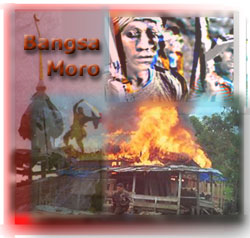|
The
Newsletter |
|
||||
| Moros: JUETENG For
Deliverance? Understanding
The Mindanao Conflict Ethnic Cleansing In
Mindanao After Abubakar's Fall: What? Is Federalizing The
Republic The Solution To Mindanao? Constitutional
Accommodation of a Bangsamoro Islamic Region Mindanao Movements Sulu Saxophone Explaining Erap's The Palestinian Intifada Creative Writing Section A Muslim's prayer
for peace Featured Links The
Academy of Natural Sciences Digital
Libraries Bioethics IslamZine Archives The book BUGS & BYTES, In Bigger Prints, is now available at National Book Store outlets in MetroManila and the Universtiy of the Philippines Press Bookshop in Diliman, Quezon City. Support B&B by searching and buying your books & CDs from here.
|
(Patricio Diaz used to edit the
Mindanao Cross and Mindanao Kris in Cotabato City. 'After Abubakar's Fall: What?'
first appeared in the Dugong Mindanaw section of the Philippine Daily Inquirer, July 15,
2000 under the title 'The 6 Buts'.)
The President, with his patronizing Cabinet members and advisers echoing him, has proclaimed the descent of lasting peace and the reign of economic development and prosperity all over Mindanao. Their optimism seems to far exceed MNLF Chair Nur Misuari's euphoria upon the signing of the 1996 Peace Agreement on Sept. 2, 1996. Peace and development were at hand, Nur proclaimed. None came other than those already on hand. That Misuari's vision proved to be nothing but vision should not be taken to mean the President's optimism is hollow. Misuari did not have the power and the resources; the President has all these and he is asking for more.
First 'But' The fall of all MILF camps cannot be naively taken as the end of the Moro rebellion for independence. It can be just the beginning of a new phase of the guerrilla war. Except for the camps and a few dead rebels, one wounded captured and MILF armaments left behind, the military does not have much to show for its conquest. No surrenderers, no booties. The military and Malacanang interpreted the light rebel resistance as the demoralization of the MILF ranks. Even if true, there is no guarantee that the many groups with their arms will not make trouble. Their morale can be whipped up. But the light resistance could just be an MILF strategy to preserve their manpower and armaments for a long war of attrition. Should this be the reality, from the fall will rise more troubles. Peace will not come; investors will be scared; foreign aid will be frozen. Second 'But' Malacanang and the military expected the MILF rebels to capitulate, lay down their arms and sign a dictated peace agreement like what Hirohito did in August 1945. But they just vanished with their arms. Now, the government says the peace negotiation is still open and it expects the MILF peace negotiators to come around on July 28. Is the government in its
right mind? It has proclaimed the MILF defeated, destroyed. Yet it still considers the
rebels intact to negotiate with the government. The MILF has lost the ground to negotiate.
It has lost the organization with which to negotiate. Anyone in his right mind will not
expect it to negotiate now. Chair Salamat Hashim has rejected the ''political package.'' Peace imposed by the military may not attract investors and donors and assistance. On these depend the so-called ''mini-Marshall plan.'' Third 'But' The government doesn't seem clear of its priorities. What does it want urgently to be developed? Muslim Mindanao or the entire Mindanao? If Muslim Mindanao, it should do the rehabilitation and reconstruction first. Investors are primarily after profit at this time. Muslim Mindanao does not have much to offer. If the entire Mindanao, they will invest if assured of the peace condition prevailing in areas not affected by the war. The more Muslim Mindanao will be left behind in socioeconomic development and this will be a negative factor to lasting peace. Because the government's priorities are not clear, it has no sure-fire policies and plans. In reality, either priority did not call for an all-out war against the MILF. The all-out war precipitated by the perceived secessionist threat was another proof of the lack of a well thought-out policy. The best way to lasting peace was still negotiation. The government admitted this by keeping alive the peace negotiation, which it had killed for good, after the fall of Abubakar. Unwittingly, the government is now admitting an empty victory. Fourth 'But' To impress the nation and the world of its concern for the devastated areas, the government announced the release of P105.6M to return and rehabilitate the refugees. What can P105.6M really do? As if to emphasize the ridiculous, the government released also P5 billion for military spending. The fund for destruction 50 times the fund for reconstruction! There is also the P2.15 billion for the integrated rehabilitation and recovery program for agrarian reform communities under the Department of Agrarian Reform. It will benefit 60,000 families in 73 Agrarian Reform Communities in Basilan, Lanao del Norte, Cotabato, Sultan Kudarat, Sarangani, Maguindanao, Lanao del Sur, Sulu and Tawi-Tawi. The government is deceiving the nation and the world. The P2.15B is evidently a regular budget of the DAR made to appear as a rehabilitation and recovery fund. Of the nine provinces, only Maguindanao and Lanao del Sur and portions of Lanao del Norte and Cotabato are really ''war-torn.'' Of the 73 ARCs, how many are in the four provinces? Peace will not descend and investors' confidence cannot be won via thinly veiled deception. Propaganda boomerangs. Fifth 'But' The government does not seem to see the real way to win the Muslims away from secession. It refuses to see the problem from the viewpoint of the Muslim masses. Devastated Muslim communities must be reconstructed and their economic resources rehabilitated. But, more important, the Muslims must be rehabilitated socially and psychologically, their human dignity restored together with their faith in justice and equality. From another view, their trust in government and their Christian neighbors must be restored. To achieve this, a special plan, not emergency powers, is needed. We don't think the special plan can be entrusted to foreign donors under the over-used Marshall plan concept. We don't think the flagship idea of development is the answer. The government must do it. Had the Marcos administration taken seriously then Datu Udtog Matalam after the publication of the Muslim Independence Movement Manifesto in 1968, this could have been done and the Moro Front revolution could have been averted. Datu Udtog then proposed in a manifesto that the President proclaim 100,000 hectares in each Muslim provinces for the Muslims. He said enough land had been given to the Christians. The estimate then was that 85 percent of the Muslims were landless. Let the President now proclaim all alienable land in Muslim Mindanao reserved for Muslim resettlement. Proclaim the establishment of Muslim resettlements in the reserved areas, which will surely include those conquered MILF camps. Subsidize these resettlements like how the government subsidized the Christian settlements in the 1940s. Let Muslim architects and engineers plan the town center and the settlement layout to suit it to Islamic and other features of Muslim life. To show no rancor, invite MILF leaders in the management of same of the settlements. In this way, the Muslims will be assured that their land will be theirs and the fruits of their toil will be theirs to share with each other. This happened in Christian settlements. We see no reason why it cannot be done for the Muslims. This is compensatory justice. In a generation or two, a new enlightened Muslim social class is expected to evolve. It means the emergence of a new leadership and a new social consciousness. This will strengthen a genuine Muslim autonomy. This is not a dream. This was done in Christian settlements from the 1940s to the 1960s. The more prosperous and cohesive Christian communities now are living testimony of what deprived people can do given the chance and the opportunity. Give the same now to the Muslims. Give them their land. Support them to make their land productive and to build prosperous and cohesive communities. This compensatory justice has long been overdue. Profit-hungry investors will not do this. Flagship projects with bias for the landed, the businessmen and the investors cannot do this. Only the government can, if it is sincere in giving the Muslim compensatory justice. The President can use his powers to launch the special plan. And Congress should follow it up with appropriate legislation. We would like to see Muslim and other Mindanao legislators unite to bring justice and peace to Muslim Mindanao. This will take time and need fund, sincerity and dedication. But, if done, it can bring lasting peace and total development after the fall of Camp Abubakar. Sixth 'But' But any effort now by the government to bring back peace, to reconstruct and rehabilitate the devastated communities and eventually convince investors to come has been overtaken by the jihad declared by MILF Chair Salamat Hashim. How the Muslim communities will respond is something to watch for. That the MILF forces will launch the jihad sends jitters especially to Christian communities. God forbid! It can be worse than the 1970s. The government can surely maintain a bold face and spend more for the military. How long can the economy hold? The Marcos administration was good for less than four years. The jihad can now be used as the reason to grant the President emergency powers. Or for the President to declare martial law in Mindanao should the jihad prosper. Investors and foreign assistance will not come. Those here now may fly away. For us in Mindanao,
post-Abubakar is a grim watch.
|
||||
| . | Copyright © 1999 - 2001 |
||||


 BY ALL indications, Camp Abubakar, the main camp of the Moro Islamic
Liberation Front, has fallen. Will lasting peace and total development follow?
BY ALL indications, Camp Abubakar, the main camp of the Moro Islamic
Liberation Front, has fallen. Will lasting peace and total development follow? Are lasting peace and total
economic development really on the way? They have to hurdle a number of ''buts.''
Are lasting peace and total
economic development really on the way? They have to hurdle a number of ''buts.''